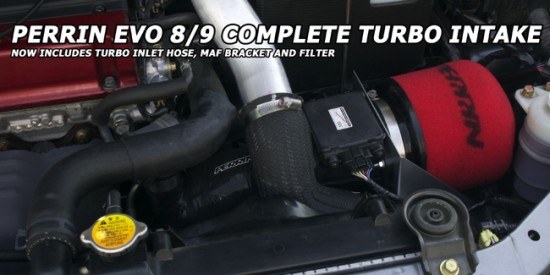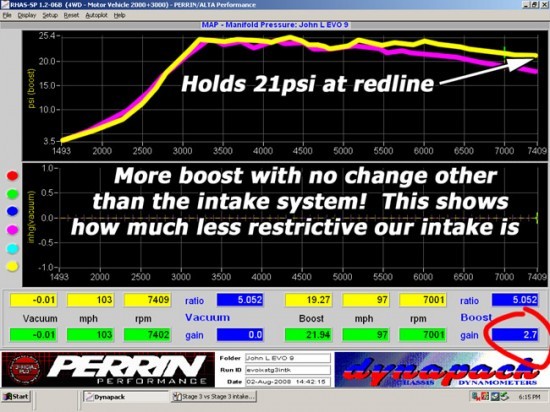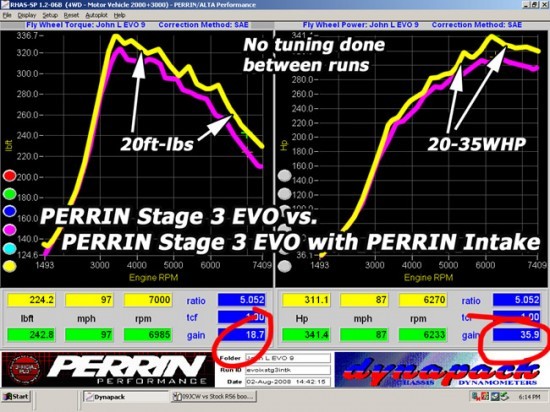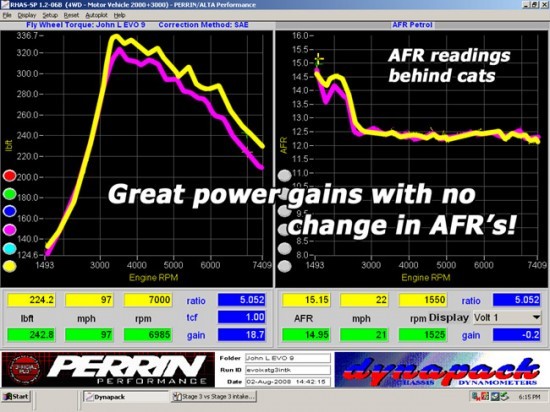Category : Dyno Test & Tune
Back to Blog
Share This
PERRIN EVO 9 Intake Test and Tune
We have been selling our EVO intakes for quite some time now and while we have proven they do not screw up the MAF readings we never did dyno test it. In the past we had to go to someone elses dyno to test things and in the past this item wasn't on the top of our list to prove. Times changed, we have our own dyno, we have time to do all the little tests we wish we could have done in the past, so its time to dyno the intake! Recently we decided to stop selling both our Air box and turbo inlet hose separately and combine it into one part. We call this new/old part the Complete Turbo intake. Since we haven't ever really dynoed this back to back on a car, we decided to do it! Yes, black is the new color for our EVO 8-10 parts!
Before we get to the results, most intakes for the EVO are very well know to screw up the MAF sensor and cause the car to run erratic and or run very lean. Lean is not a good thing and neither is a car that doesn't run smooth. We knew why a lot of them didn't work and fixed the issue and have been selling them ever since. With that all said, the HP we were expecting was in the 10WHP area. This is what we normally see on most cars but the EVO would prove to be different.
Our Stage kits for the EVO have revolved around the AccessPORT and our parts, but we have left the intake out of the loop until now.
We first did some tweaking of the Stage 3 mapping (turboback, AccessPORT and FMIC) and before we finished, we prepped some of the clamps to be easier to remove for when it came time to swap the intake. With 7 runs done on this 92 degree day, we swapped the intake as quick as we could (took about 20min), then we did some more runs.
Run one was done while the engine was 170F, and it showed one very interest thing. More boost, oh and some HP. But we chalked it up to being a little cold. Run 2 the engine was fully warmed and same increase in boost, and even more power! In fact 30WHP! We were very surprised. We did 5 more runs to back it up and very consistently we got 30WHP!
First lets look at the boost. The boost is higher from 5500RPM on up, which is where we also see the HP start to climb. These runs were done with ZERO change to the mapping of the ECU. This means no change to the boost parameters, or targets or anything. These results show the stock intake is a restrictive part of the engine.
Yes, black is the new color for our EVO 8-10 parts!
Before we get to the results, most intakes for the EVO are very well know to screw up the MAF sensor and cause the car to run erratic and or run very lean. Lean is not a good thing and neither is a car that doesn't run smooth. We knew why a lot of them didn't work and fixed the issue and have been selling them ever since. With that all said, the HP we were expecting was in the 10WHP area. This is what we normally see on most cars but the EVO would prove to be different.
Our Stage kits for the EVO have revolved around the AccessPORT and our parts, but we have left the intake out of the loop until now.
We first did some tweaking of the Stage 3 mapping (turboback, AccessPORT and FMIC) and before we finished, we prepped some of the clamps to be easier to remove for when it came time to swap the intake. With 7 runs done on this 92 degree day, we swapped the intake as quick as we could (took about 20min), then we did some more runs.
Run one was done while the engine was 170F, and it showed one very interest thing. More boost, oh and some HP. But we chalked it up to being a little cold. Run 2 the engine was fully warmed and same increase in boost, and even more power! In fact 30WHP! We were very surprised. We did 5 more runs to back it up and very consistently we got 30WHP!
First lets look at the boost. The boost is higher from 5500RPM on up, which is where we also see the HP start to climb. These runs were done with ZERO change to the mapping of the ECU. This means no change to the boost parameters, or targets or anything. These results show the stock intake is a restrictive part of the engine.
 Shows how restrictive the stock intake really is in stage 3 form!
The dyno graphs back up the HP we consistently saw from run to run. In fact the run we used to show off the HP was one of the last runs of the set we did. This was done to show the HP gains on a slightly heat soaked car. There is no place the car lost HP. In fact it just gained power everywhere!
Shows how restrictive the stock intake really is in stage 3 form!
The dyno graphs back up the HP we consistently saw from run to run. In fact the run we used to show off the HP was one of the last runs of the set we did. This was done to show the HP gains on a slightly heat soaked car. There is no place the car lost HP. In fact it just gained power everywhere!
 Not much to say here, more power!
The last graph we have is the AFR (Air Fuel Ratio) curve showing that the intake doesn't change MAF readings at all! This is one of the most important things to look at. There are intakes that screw up the MAF so bad that CEL's (Check engine lights) appear and they loose power. With these 3 graphs you can see that this is just not the case with our Intake system.
Not much to say here, more power!
The last graph we have is the AFR (Air Fuel Ratio) curve showing that the intake doesn't change MAF readings at all! This is one of the most important things to look at. There are intakes that screw up the MAF so bad that CEL's (Check engine lights) appear and they loose power. With these 3 graphs you can see that this is just not the case with our Intake system.
 Safe AFR's means safe car, means its runs perfect, and makes great power!
So needless to say, the intake works! With a solid 20 ft-lbs and 30WHP from the intake, there is no reason why all EVO owners shouldn't consider this.
Keep in mind not intakes are created equally. Different pipes, bends, filters, and a few other things can affect how the intake meters air. Small turbulences will affect the readings and screw with how the car runs. The MAF on the EVO is a very sensitive sensor, and is known to not be happy with small changes to filters and BOV's. The above info proves our PERRIN Intake system runs the car perfectly and safely while making huge power gains!
Safe AFR's means safe car, means its runs perfect, and makes great power!
So needless to say, the intake works! With a solid 20 ft-lbs and 30WHP from the intake, there is no reason why all EVO owners shouldn't consider this.
Keep in mind not intakes are created equally. Different pipes, bends, filters, and a few other things can affect how the intake meters air. Small turbulences will affect the readings and screw with how the car runs. The MAF on the EVO is a very sensitive sensor, and is known to not be happy with small changes to filters and BOV's. The above info proves our PERRIN Intake system runs the car perfectly and safely while making huge power gains!


